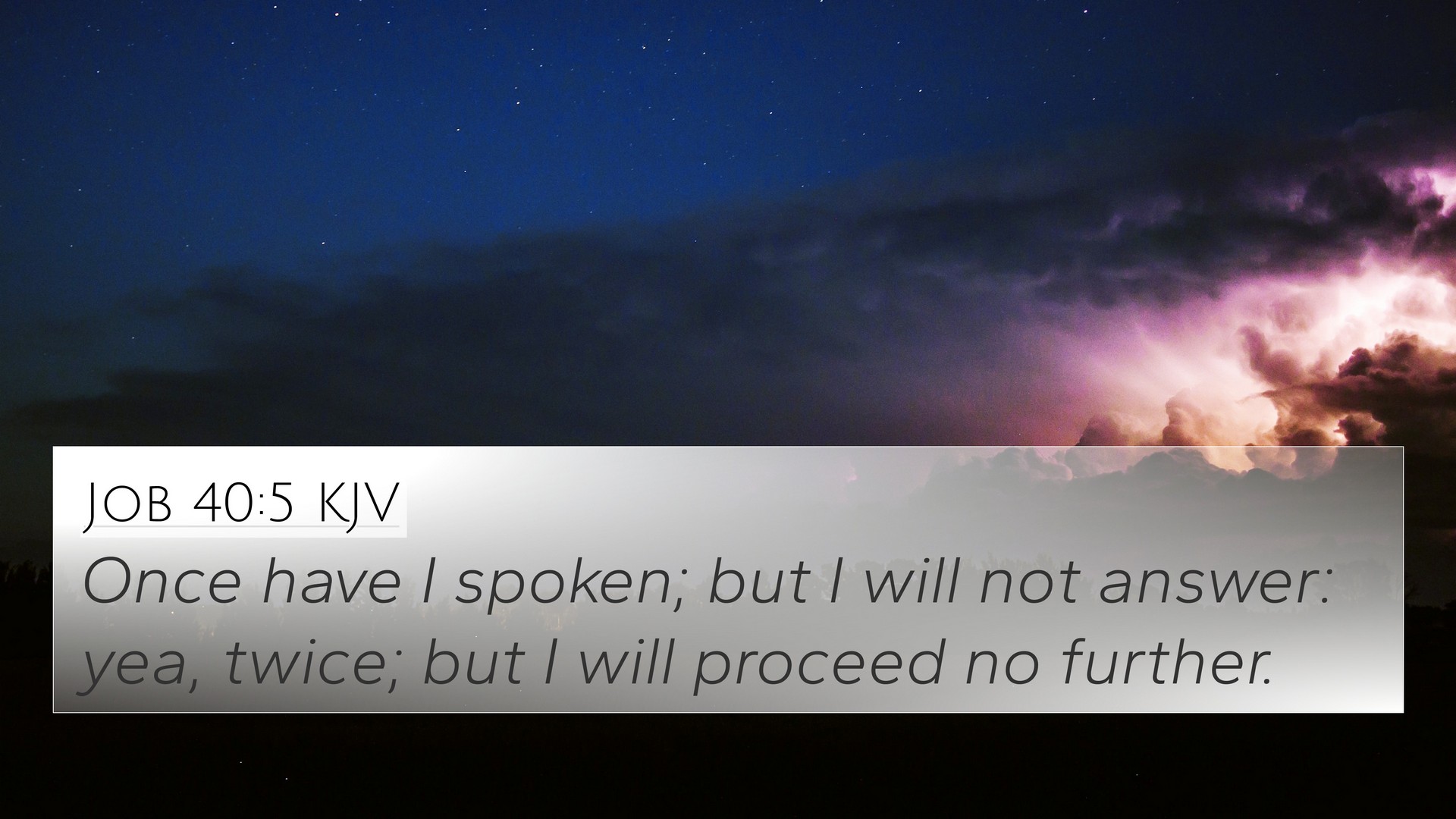Old Testament
Genesis Exodus Leviticus Numbers Deuteronomy Joshua Judges Ruth 1 Samuel 2 Samuel 1 Kings 2 Kings 1 Chronicles 2 Chronicles Ezra Nehemiah Esther Job Psalms Proverbs Ecclesiastes Song of Solomon Isaiah Jeremiah Lamentations Ezekiel Daniel Hosea Joel Amos Obadiah Jonah Micah Nahum Habakkuk Zephaniah Haggai Zechariah MalachiJob 40:5 Similar Verses
Job 40:5 Cross References
Once have I spoken; but I will not answer: yea, twice; but I will proceed no further.
Uncover the Rich Themes and Topics of This Bible Verse
Listed below are the Bible themes associated with Job 40:5. We invite you to explore each theme to gain deeper insights into the Scriptures.
Job 40:5 Cross Reference Verses
This section features a detailed cross-reference designed to enrich your understanding of the Scriptures. Below, you will find carefully selected verses that echo the themes and teachings related to Job 40:5 KJV. Click on any image to explore detailed analyses of related Bible verses and uncover deeper theological insights.

2 Kings 6:10 (KJV) »
And the king of Israel sent to the place which the man of God told him and warned him of, and saved himself there, not once nor twice.

Job 9:15 (KJV) »
Whom, though I were righteous, yet would I not answer, but I would make supplication to my judge.

Job 34:31 (KJV) »
Surely it is meet to be said unto God, I have borne chastisement, I will not offend any more:

Jeremiah 31:18 (KJV) »
I have surely heard Ephraim bemoaning himself thus; Thou hast chastised me, and I was chastised, as a bullock unaccustomed to the yoke: turn thou me, and I shall be turned; for thou art the LORD my God.

Romans 3:19 (KJV) »
Now we know that what things soever the law saith, it saith to them who are under the law: that every mouth may be stopped, and all the world may become guilty before God.
Job 40:5 Verse Analysis and Similar Verses
Understanding Job 40:5
Job 40:5 states, "Once have I spoken; but I will not answer: yea, twice; but I will proceed no further." This verse embodies a pivotal moment in the dialogue between Job and God. To fully unpack its meaning, let us draw insights from esteemed public domain commentaries, providing a comprehensive analysis and inter-Biblical connections.
Commentary Insights
This verse captures Job's response to God's challenging questions presented in the earlier chapters. Here's a breakdown of the interpretations:
-
Matthew Henry's Commentary:
Henry notes that Job recognizes the authority and sovereignty of God. In his admission of silence after speaking twice, Job portrays humility and a realization of his limited comprehension in the face of divine majesty. This humility is reflected in Job's acknowledgment that human understanding is dwarfed by God's power.
-
Albert Barnes' Notes:
Barnes emphasizes that Job, having previously spoken in defense of his innocence, now understands the futility of arguing further. His response indicates a transition from questioning God to a posture of reverence. It signifies a point where Job submits to divine wisdom and expresses a willingness to listen rather than respond.
-
Adam Clarke's Commentary:
Clarke observes that here, Job's silence signifies a wise recognition of his own limitations. Clarke further points out that this moment marks a critical point in Job's journey towards understanding suffering, portraying how true wisdom often involves knowing when to remain silent before God.
Thematic Connections
Job 40:5 introduces themes of humility, reverence, and the quest for understanding amid suffering. These themes resonate with numerous other scripture passages:
- Proverbs 3:7: "Be not wise in thine own eyes: fear the Lord, and depart from evil." This verse reinforces the theme of humility before God.
- Ecclesiastes 5:2: "Be not rash with thy mouth, and let not thine heart be hasty to utter any thing before God: for God is in heaven, and thou upon earth: therefore let thy words be few." Reflects a similar sentiment of being cautious in speech.
- Isaiah 55:8-9: "For my thoughts are not your thoughts, neither are your ways my ways, saith the Lord." Emphasizes the vast difference between divine and human understanding.
- Romans 9:20: "Nay but, O man, who art thou that repliest against God?" Aligns with Job's realization of his place before God.
- James 1:19: "Wherefore, my beloved brethren, let every man be swift to hear, slow to speak, slow to wrath." Advocates for listening over speaking, echoing Job's moment of reflection.
- Job 38:2-3: "Who is this that darkeneth counsel by words without knowledge?" Here, God speaks to Job, establishing the context for Job's humility.
- Habakkuk 2:20: "But the Lord is in his holy temple: let all the earth keep silence before him." Invites reflection and silence before God.
Cross-Referencing Job 40:5
To enhance our understanding of Job 40:5, it is beneficial to explore how this verse interconnects with others in the Scripture. Here are notable cross-references:
- Job 13:19: "Who is he that will plead with me? For now, if I hold my tongue, I shall give up the ghost."
- Job 29:9: “The princes refrained talking, and laid their hand on their mouth.”
- Proverbs 10:19: "In the multitude of words there wanteth not sin: but he that refraineth his lips is wise."
- 1 Peter 5:6: "Humble yourselves therefore under the mighty hand of God, that he may exalt you in due time."
- Matthew 11:29: "Take my yoke upon you, and learn of me; for I am meek and lowly in heart."
- Malachi 1:14: "...for I am a great King, saith the Lord of hosts, and my name is dreadful among the heathen."
- Philippians 2:10-11: "That at the name of Jesus every knee should bow..."
Applying Job 40:5 Today
The application of Job 40:5 in today’s context serves as a profound reminder for believers. In our pursuit of understanding and in dealing with life's trials, it is crucial to adopt a posture of humility. Recognizing the vast wisdom of God calls for:
- Humility in Prayer: Approaching God with a heart willing to listen and learn.
- Acceptance of Limitations: Understanding that our human perspective is inherently limited.
- Deepening Faith: Trusting God’s purpose even when it appears beyond our comprehension.
- Reflective Silence: Embracing moments of silence before God to hear His voice.
Conclusion
Job 40:5 encapsulates a moment of transformation in Job's understanding of God and his situation. By integrating insights from various commentaries along with thematic connections and scriptural parallels, we gain a deeper appreciation of this profound verse. It urges us to reflect on our relationship with God, enticing us to develop humility and knowledge in our spiritual walk. Through cross-referencing and thematic analysis, we recognize the interconnectedness of the Scriptures, enriching our study and understanding of the Bible as a whole.





